City Hospital: Nursing Management Report on Leadership and Strategies
VerifiedAdded on 2022/09/18
|17
|5133
|35
Report
AI Summary
This report details a nursing management plan for a community hospital, named City Hospital, focusing on leadership, team development, and conflict management. The report outlines the hospital's mission to provide quality healthcare, its organizational structure, and the nurse manager's key attributes, including critical thinking, communication, emotional intelligence, and dedication to excellence. Strategies for empowering staff, such as leadership development, shared decision-making, feedback, and recognition, are also discussed. The report emphasizes the importance of effective communication, emotional intelligence, and staff empowerment to achieve the hospital's goals of delivering exceptional patient care and fostering a positive work environment. It provides insights into the role of a nurse manager in creating a supportive and productive healthcare setting, highlighting the significance of continuous learning and staff involvement in decision-making processes.
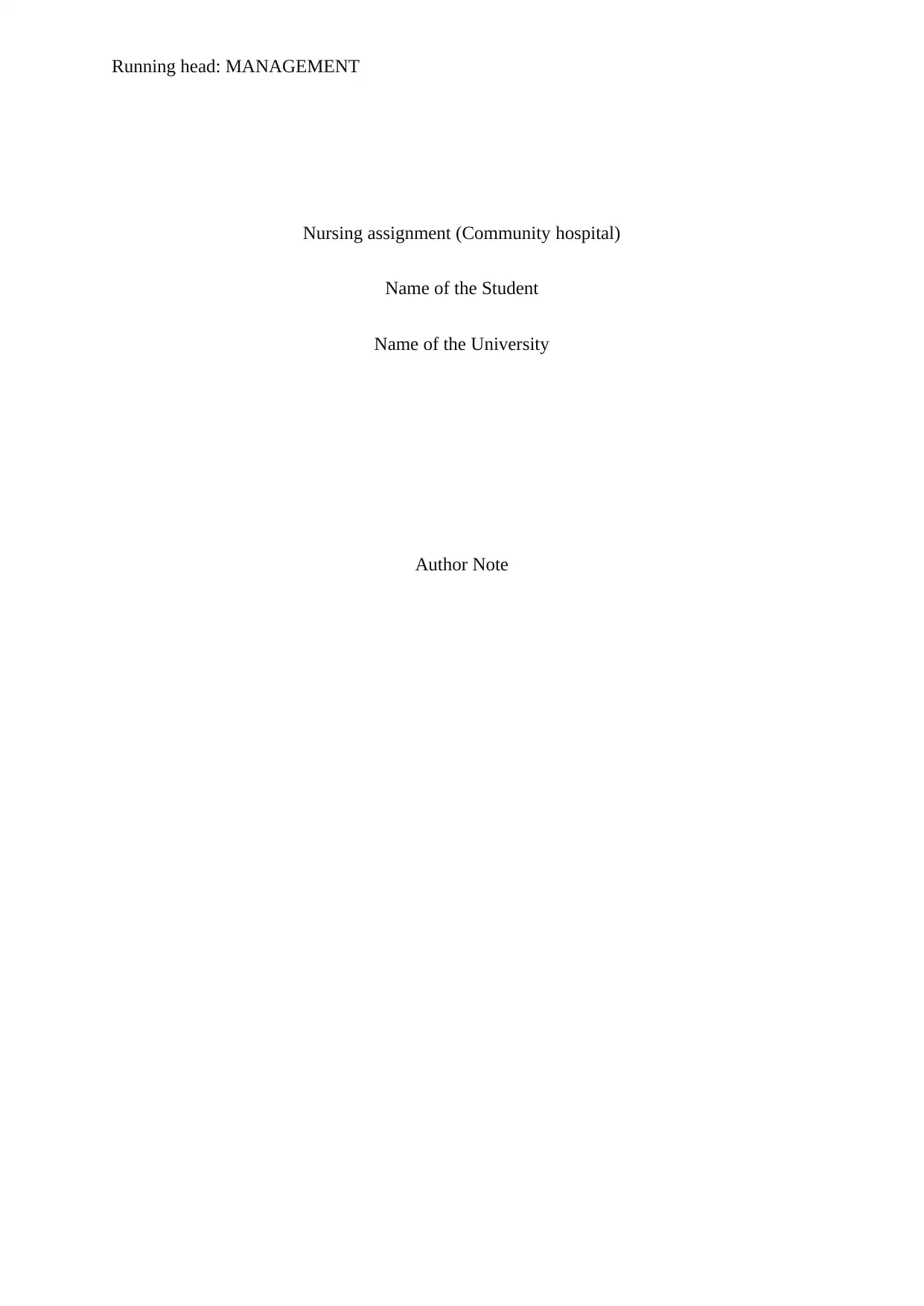
Running head: MANAGEMENT
Nursing assignment (Community hospital)
Name of the Student
Name of the University
Author Note
Nursing assignment (Community hospital)
Name of the Student
Name of the University
Author Note
Paraphrase This Document
Need a fresh take? Get an instant paraphrase of this document with our AI Paraphraser

1MANAGEMENT
Introduction- Nurse Managers have the duty of leading the nursing profession and are
accountable for the development of a healthy and safe environment. Moreover, researchers
have elucidated that the role of Nurse Managers in influential in the development of a
professional setting, and fostering a workplace culture that allows multidisciplinary team
members to contribute effectively (Hewko et al., 2015). This in turn helps in enhancing
patient outcomes and also promotes their professional growth. According to Urden, Stacy and
Lough (2017) nursing management comprises of different performance related to leadership
functions of clinical decision making and governance, within healthcare organisations. Time
and again it has been found that the nurse leader or manager is entitled with the responsibility
of supervising the care delivered to all patients at the healthcare organisation and holds a
senior management position within the organisational hierarchy (Kelly & Quesnelle, 2016).
Moreover, Nurse Managers generally report to the service director and have the chief
responsibilities of looking after budgeting, staffing, resources, day-to-day functioning of the
unit, complaint investigation, bed side teaching, and conduction of educational programs for
enhancing professional development of the healthcare workers (Miltner, Jukkala, Dawson &
Patrician, 2015). Nurses serving in management positions are expected to have strong
leadership and communication skills, and must be skilful at striking a balance between the
administrators of the healthcare organisation and the nursing staff. This essay will elaborate
on an organisation that will be created (community hospital), along with leadership
characteristics, team development, and conflict management.
Type of organisation- I intend to develop a community hospital, named City Hospital,
while working as a nursing manager. Present day healthcare is undergoing several changes
from inpatient-based services to outpatient-based ones, where the healthcare providers are
predominantly concerned with ensuring health and wellbeing of their patients. Community
hospitals have been identified to play an important role in post-acute care and also facilitate
Introduction- Nurse Managers have the duty of leading the nursing profession and are
accountable for the development of a healthy and safe environment. Moreover, researchers
have elucidated that the role of Nurse Managers in influential in the development of a
professional setting, and fostering a workplace culture that allows multidisciplinary team
members to contribute effectively (Hewko et al., 2015). This in turn helps in enhancing
patient outcomes and also promotes their professional growth. According to Urden, Stacy and
Lough (2017) nursing management comprises of different performance related to leadership
functions of clinical decision making and governance, within healthcare organisations. Time
and again it has been found that the nurse leader or manager is entitled with the responsibility
of supervising the care delivered to all patients at the healthcare organisation and holds a
senior management position within the organisational hierarchy (Kelly & Quesnelle, 2016).
Moreover, Nurse Managers generally report to the service director and have the chief
responsibilities of looking after budgeting, staffing, resources, day-to-day functioning of the
unit, complaint investigation, bed side teaching, and conduction of educational programs for
enhancing professional development of the healthcare workers (Miltner, Jukkala, Dawson &
Patrician, 2015). Nurses serving in management positions are expected to have strong
leadership and communication skills, and must be skilful at striking a balance between the
administrators of the healthcare organisation and the nursing staff. This essay will elaborate
on an organisation that will be created (community hospital), along with leadership
characteristics, team development, and conflict management.
Type of organisation- I intend to develop a community hospital, named City Hospital,
while working as a nursing manager. Present day healthcare is undergoing several changes
from inpatient-based services to outpatient-based ones, where the healthcare providers are
predominantly concerned with ensuring health and wellbeing of their patients. Community
hospitals have been identified to play an important role in post-acute care and also facilitate
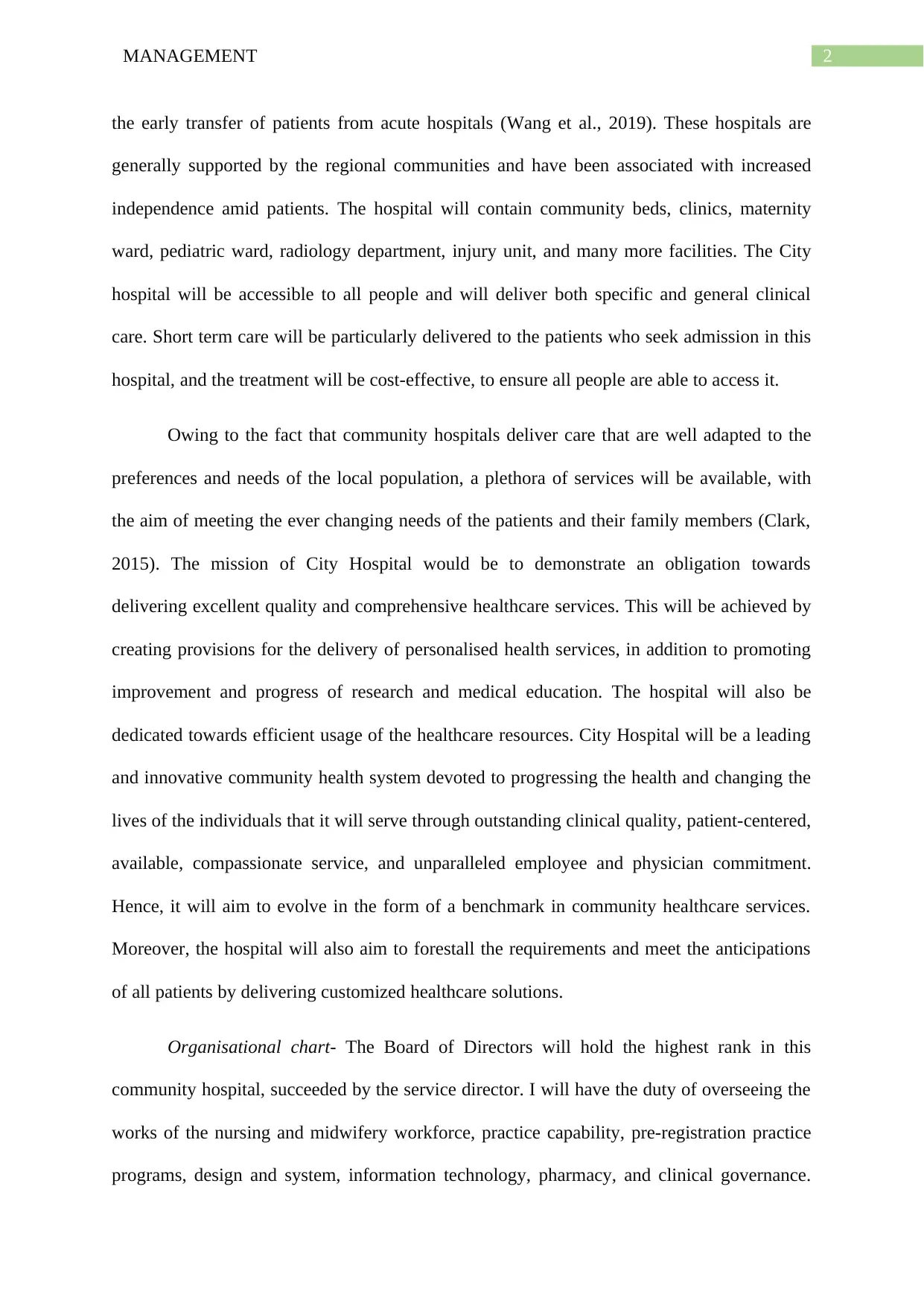
2MANAGEMENT
the early transfer of patients from acute hospitals (Wang et al., 2019). These hospitals are
generally supported by the regional communities and have been associated with increased
independence amid patients. The hospital will contain community beds, clinics, maternity
ward, pediatric ward, radiology department, injury unit, and many more facilities. The City
hospital will be accessible to all people and will deliver both specific and general clinical
care. Short term care will be particularly delivered to the patients who seek admission in this
hospital, and the treatment will be cost-effective, to ensure all people are able to access it.
Owing to the fact that community hospitals deliver care that are well adapted to the
preferences and needs of the local population, a plethora of services will be available, with
the aim of meeting the ever changing needs of the patients and their family members (Clark,
2015). The mission of City Hospital would be to demonstrate an obligation towards
delivering excellent quality and comprehensive healthcare services. This will be achieved by
creating provisions for the delivery of personalised health services, in addition to promoting
improvement and progress of research and medical education. The hospital will also be
dedicated towards efficient usage of the healthcare resources. City Hospital will be a leading
and innovative community health system devoted to progressing the health and changing the
lives of the individuals that it will serve through outstanding clinical quality, patient-centered,
available, compassionate service, and unparalleled employee and physician commitment.
Hence, it will aim to evolve in the form of a benchmark in community healthcare services.
Moreover, the hospital will also aim to forestall the requirements and meet the anticipations
of all patients by delivering customized healthcare solutions.
Organisational chart- The Board of Directors will hold the highest rank in this
community hospital, succeeded by the service director. I will have the duty of overseeing the
works of the nursing and midwifery workforce, practice capability, pre-registration practice
programs, design and system, information technology, pharmacy, and clinical governance.
the early transfer of patients from acute hospitals (Wang et al., 2019). These hospitals are
generally supported by the regional communities and have been associated with increased
independence amid patients. The hospital will contain community beds, clinics, maternity
ward, pediatric ward, radiology department, injury unit, and many more facilities. The City
hospital will be accessible to all people and will deliver both specific and general clinical
care. Short term care will be particularly delivered to the patients who seek admission in this
hospital, and the treatment will be cost-effective, to ensure all people are able to access it.
Owing to the fact that community hospitals deliver care that are well adapted to the
preferences and needs of the local population, a plethora of services will be available, with
the aim of meeting the ever changing needs of the patients and their family members (Clark,
2015). The mission of City Hospital would be to demonstrate an obligation towards
delivering excellent quality and comprehensive healthcare services. This will be achieved by
creating provisions for the delivery of personalised health services, in addition to promoting
improvement and progress of research and medical education. The hospital will also be
dedicated towards efficient usage of the healthcare resources. City Hospital will be a leading
and innovative community health system devoted to progressing the health and changing the
lives of the individuals that it will serve through outstanding clinical quality, patient-centered,
available, compassionate service, and unparalleled employee and physician commitment.
Hence, it will aim to evolve in the form of a benchmark in community healthcare services.
Moreover, the hospital will also aim to forestall the requirements and meet the anticipations
of all patients by delivering customized healthcare solutions.
Organisational chart- The Board of Directors will hold the highest rank in this
community hospital, succeeded by the service director. I will have the duty of overseeing the
works of the nursing and midwifery workforce, practice capability, pre-registration practice
programs, design and system, information technology, pharmacy, and clinical governance.
⊘ This is a preview!⊘
Do you want full access?
Subscribe today to unlock all pages.

Trusted by 1+ million students worldwide
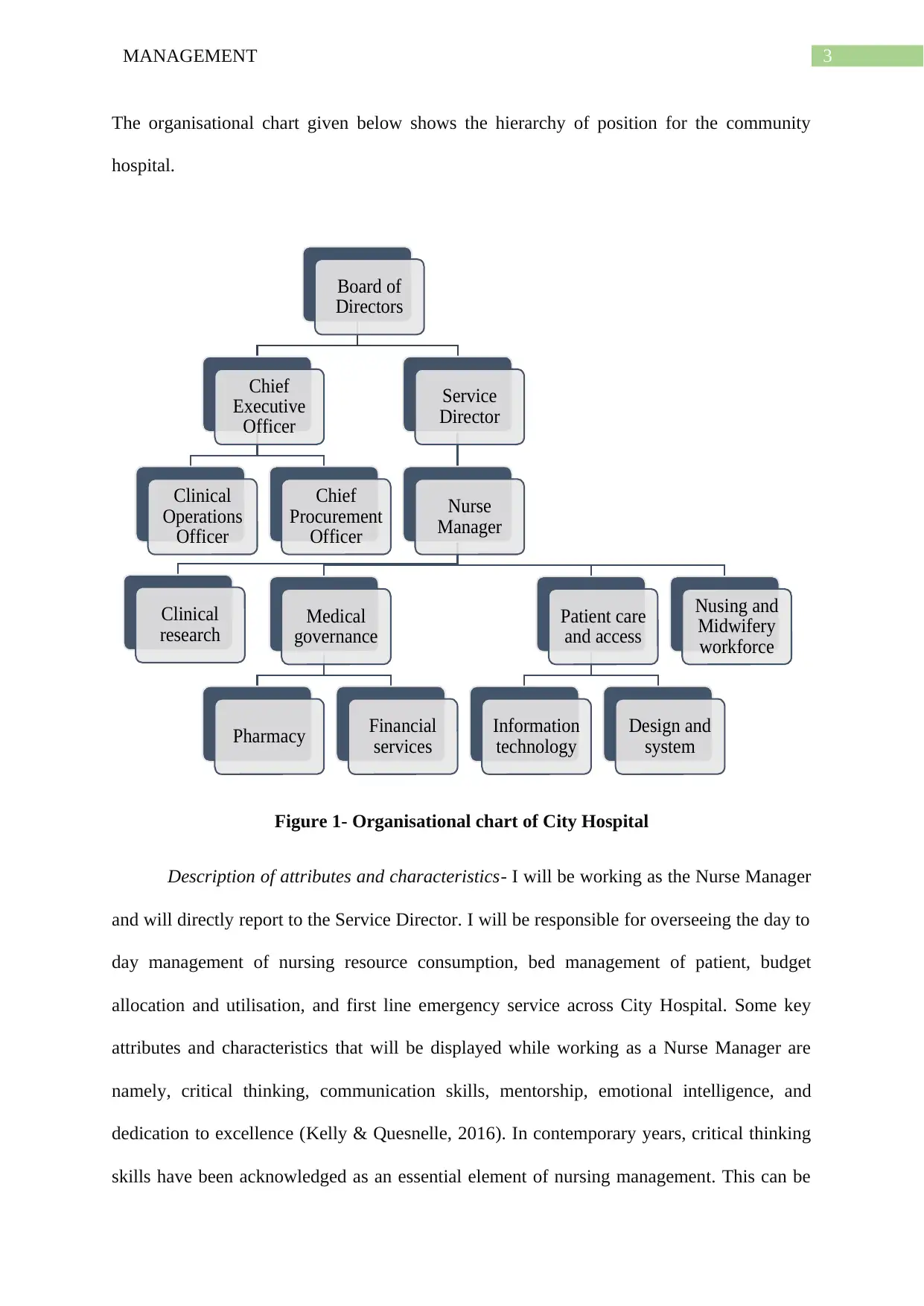
3MANAGEMENT
The organisational chart given below shows the hierarchy of position for the community
hospital.
Figure 1- Organisational chart of City Hospital
Description of attributes and characteristics- I will be working as the Nurse Manager
and will directly report to the Service Director. I will be responsible for overseeing the day to
day management of nursing resource consumption, bed management of patient, budget
allocation and utilisation, and first line emergency service across City Hospital. Some key
attributes and characteristics that will be displayed while working as a Nurse Manager are
namely, critical thinking, communication skills, mentorship, emotional intelligence, and
dedication to excellence (Kelly & Quesnelle, 2016). In contemporary years, critical thinking
skills have been acknowledged as an essential element of nursing management. This can be
Board of
Directors
Chief
Executive
Officer
Clinical
Operations
Officer
Chief
Procurement
Officer
Service
Director
Nurse
Manager
Clinical
research Medical
governance
Pharmacy Financial
services
Patient care
and access
Information
technology
Design and
system
Nusing and
Midwifery
workforce
The organisational chart given below shows the hierarchy of position for the community
hospital.
Figure 1- Organisational chart of City Hospital
Description of attributes and characteristics- I will be working as the Nurse Manager
and will directly report to the Service Director. I will be responsible for overseeing the day to
day management of nursing resource consumption, bed management of patient, budget
allocation and utilisation, and first line emergency service across City Hospital. Some key
attributes and characteristics that will be displayed while working as a Nurse Manager are
namely, critical thinking, communication skills, mentorship, emotional intelligence, and
dedication to excellence (Kelly & Quesnelle, 2016). In contemporary years, critical thinking
skills have been acknowledged as an essential element of nursing management. This can be
Board of
Directors
Chief
Executive
Officer
Clinical
Operations
Officer
Chief
Procurement
Officer
Service
Director
Nurse
Manager
Clinical
research Medical
governance
Pharmacy Financial
services
Patient care
and access
Information
technology
Design and
system
Nusing and
Midwifery
workforce
Paraphrase This Document
Need a fresh take? Get an instant paraphrase of this document with our AI Paraphraser
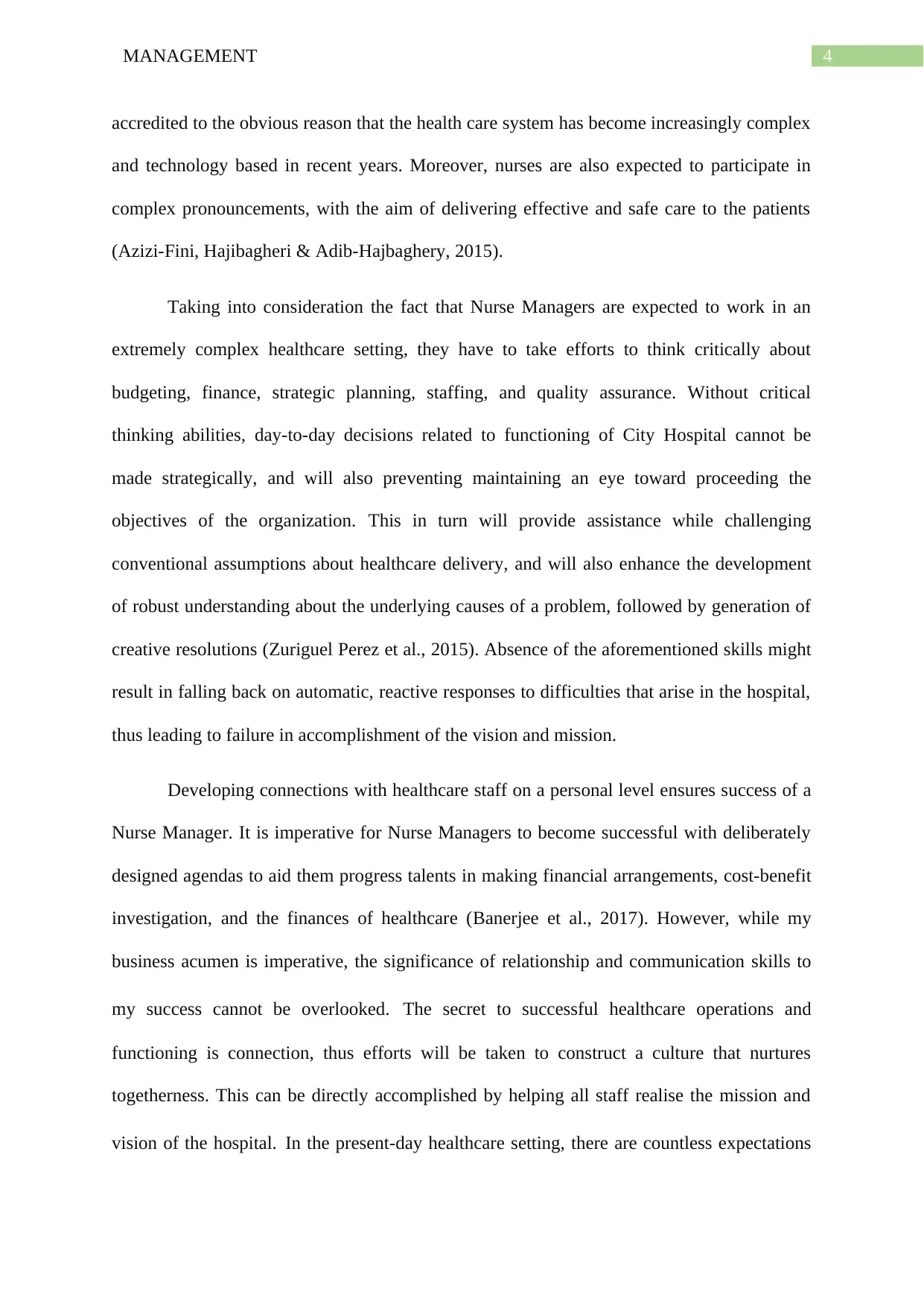
4MANAGEMENT
accredited to the obvious reason that the health care system has become increasingly complex
and technology based in recent years. Moreover, nurses are also expected to participate in
complex pronouncements, with the aim of delivering effective and safe care to the patients
(Azizi-Fini, Hajibagheri & Adib-Hajbaghery, 2015).
Taking into consideration the fact that Nurse Managers are expected to work in an
extremely complex healthcare setting, they have to take efforts to think critically about
budgeting, finance, strategic planning, staffing, and quality assurance. Without critical
thinking abilities, day-to-day decisions related to functioning of City Hospital cannot be
made strategically, and will also preventing maintaining an eye toward proceeding the
objectives of the organization. This in turn will provide assistance while challenging
conventional assumptions about healthcare delivery, and will also enhance the development
of robust understanding about the underlying causes of a problem, followed by generation of
creative resolutions (Zuriguel Perez et al., 2015). Absence of the aforementioned skills might
result in falling back on automatic, reactive responses to difficulties that arise in the hospital,
thus leading to failure in accomplishment of the vision and mission.
Developing connections with healthcare staff on a personal level ensures success of a
Nurse Manager. It is imperative for Nurse Managers to become successful with deliberately
designed agendas to aid them progress talents in making financial arrangements, cost-benefit
investigation, and the finances of healthcare (Banerjee et al., 2017). However, while my
business acumen is imperative, the significance of relationship and communication skills to
my success cannot be overlooked. The secret to successful healthcare operations and
functioning is connection, thus efforts will be taken to construct a culture that nurtures
togetherness. This can be directly accomplished by helping all staff realise the mission and
vision of the hospital. In the present-day healthcare setting, there are countless expectations
accredited to the obvious reason that the health care system has become increasingly complex
and technology based in recent years. Moreover, nurses are also expected to participate in
complex pronouncements, with the aim of delivering effective and safe care to the patients
(Azizi-Fini, Hajibagheri & Adib-Hajbaghery, 2015).
Taking into consideration the fact that Nurse Managers are expected to work in an
extremely complex healthcare setting, they have to take efforts to think critically about
budgeting, finance, strategic planning, staffing, and quality assurance. Without critical
thinking abilities, day-to-day decisions related to functioning of City Hospital cannot be
made strategically, and will also preventing maintaining an eye toward proceeding the
objectives of the organization. This in turn will provide assistance while challenging
conventional assumptions about healthcare delivery, and will also enhance the development
of robust understanding about the underlying causes of a problem, followed by generation of
creative resolutions (Zuriguel Perez et al., 2015). Absence of the aforementioned skills might
result in falling back on automatic, reactive responses to difficulties that arise in the hospital,
thus leading to failure in accomplishment of the vision and mission.
Developing connections with healthcare staff on a personal level ensures success of a
Nurse Manager. It is imperative for Nurse Managers to become successful with deliberately
designed agendas to aid them progress talents in making financial arrangements, cost-benefit
investigation, and the finances of healthcare (Banerjee et al., 2017). However, while my
business acumen is imperative, the significance of relationship and communication skills to
my success cannot be overlooked. The secret to successful healthcare operations and
functioning is connection, thus efforts will be taken to construct a culture that nurtures
togetherness. This can be directly accomplished by helping all staff realise the mission and
vision of the hospital. In the present-day healthcare setting, there are countless expectations
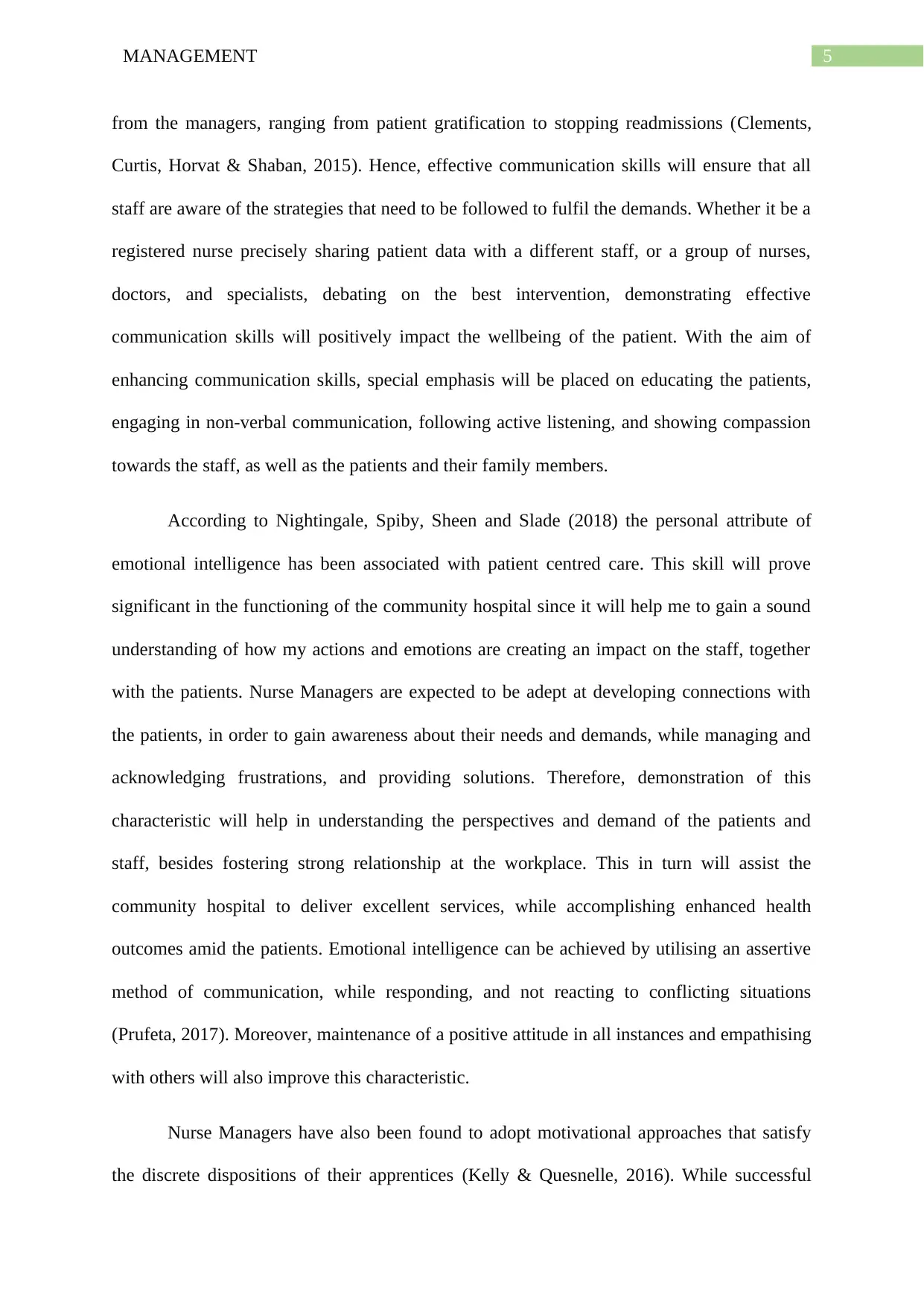
5MANAGEMENT
from the managers, ranging from patient gratification to stopping readmissions (Clements,
Curtis, Horvat & Shaban, 2015). Hence, effective communication skills will ensure that all
staff are aware of the strategies that need to be followed to fulfil the demands. Whether it be a
registered nurse precisely sharing patient data with a different staff, or a group of nurses,
doctors, and specialists, debating on the best intervention, demonstrating effective
communication skills will positively impact the wellbeing of the patient. With the aim of
enhancing communication skills, special emphasis will be placed on educating the patients,
engaging in non-verbal communication, following active listening, and showing compassion
towards the staff, as well as the patients and their family members.
According to Nightingale, Spiby, Sheen and Slade (2018) the personal attribute of
emotional intelligence has been associated with patient centred care. This skill will prove
significant in the functioning of the community hospital since it will help me to gain a sound
understanding of how my actions and emotions are creating an impact on the staff, together
with the patients. Nurse Managers are expected to be adept at developing connections with
the patients, in order to gain awareness about their needs and demands, while managing and
acknowledging frustrations, and providing solutions. Therefore, demonstration of this
characteristic will help in understanding the perspectives and demand of the patients and
staff, besides fostering strong relationship at the workplace. This in turn will assist the
community hospital to deliver excellent services, while accomplishing enhanced health
outcomes amid the patients. Emotional intelligence can be achieved by utilising an assertive
method of communication, while responding, and not reacting to conflicting situations
(Prufeta, 2017). Moreover, maintenance of a positive attitude in all instances and empathising
with others will also improve this characteristic.
Nurse Managers have also been found to adopt motivational approaches that satisfy
the discrete dispositions of their apprentices (Kelly & Quesnelle, 2016). While successful
from the managers, ranging from patient gratification to stopping readmissions (Clements,
Curtis, Horvat & Shaban, 2015). Hence, effective communication skills will ensure that all
staff are aware of the strategies that need to be followed to fulfil the demands. Whether it be a
registered nurse precisely sharing patient data with a different staff, or a group of nurses,
doctors, and specialists, debating on the best intervention, demonstrating effective
communication skills will positively impact the wellbeing of the patient. With the aim of
enhancing communication skills, special emphasis will be placed on educating the patients,
engaging in non-verbal communication, following active listening, and showing compassion
towards the staff, as well as the patients and their family members.
According to Nightingale, Spiby, Sheen and Slade (2018) the personal attribute of
emotional intelligence has been associated with patient centred care. This skill will prove
significant in the functioning of the community hospital since it will help me to gain a sound
understanding of how my actions and emotions are creating an impact on the staff, together
with the patients. Nurse Managers are expected to be adept at developing connections with
the patients, in order to gain awareness about their needs and demands, while managing and
acknowledging frustrations, and providing solutions. Therefore, demonstration of this
characteristic will help in understanding the perspectives and demand of the patients and
staff, besides fostering strong relationship at the workplace. This in turn will assist the
community hospital to deliver excellent services, while accomplishing enhanced health
outcomes amid the patients. Emotional intelligence can be achieved by utilising an assertive
method of communication, while responding, and not reacting to conflicting situations
(Prufeta, 2017). Moreover, maintenance of a positive attitude in all instances and empathising
with others will also improve this characteristic.
Nurse Managers have also been found to adopt motivational approaches that satisfy
the discrete dispositions of their apprentices (Kelly & Quesnelle, 2016). While successful
⊘ This is a preview!⊘
Do you want full access?
Subscribe today to unlock all pages.

Trusted by 1+ million students worldwide
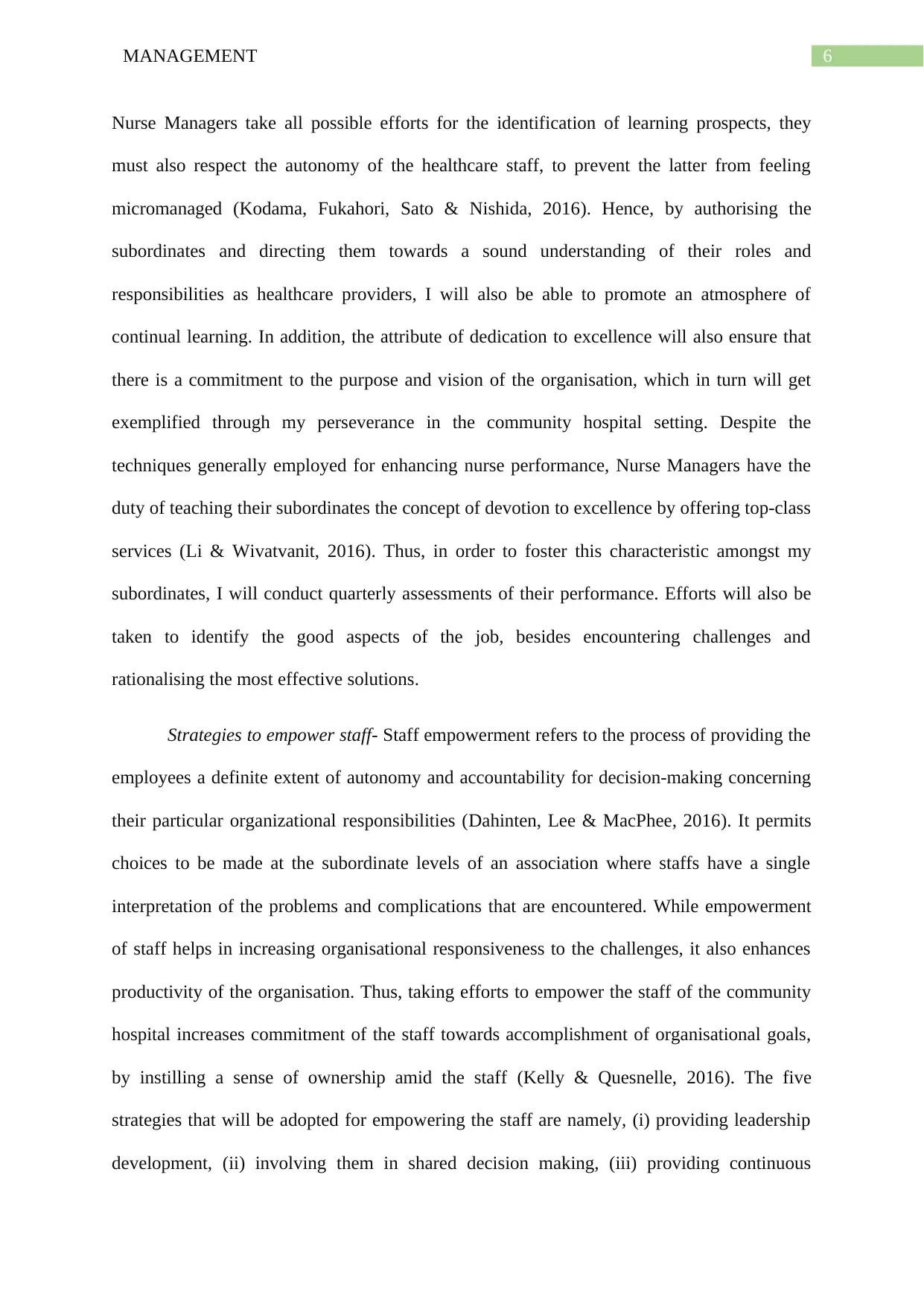
6MANAGEMENT
Nurse Managers take all possible efforts for the identification of learning prospects, they
must also respect the autonomy of the healthcare staff, to prevent the latter from feeling
micromanaged (Kodama, Fukahori, Sato & Nishida, 2016). Hence, by authorising the
subordinates and directing them towards a sound understanding of their roles and
responsibilities as healthcare providers, I will also be able to promote an atmosphere of
continual learning. In addition, the attribute of dedication to excellence will also ensure that
there is a commitment to the purpose and vision of the organisation, which in turn will get
exemplified through my perseverance in the community hospital setting. Despite the
techniques generally employed for enhancing nurse performance, Nurse Managers have the
duty of teaching their subordinates the concept of devotion to excellence by offering top-class
services (Li & Wivatvanit, 2016). Thus, in order to foster this characteristic amongst my
subordinates, I will conduct quarterly assessments of their performance. Efforts will also be
taken to identify the good aspects of the job, besides encountering challenges and
rationalising the most effective solutions.
Strategies to empower staff- Staff empowerment refers to the process of providing the
employees a definite extent of autonomy and accountability for decision-making concerning
their particular organizational responsibilities (Dahinten, Lee & MacPhee, 2016). It permits
choices to be made at the subordinate levels of an association where staffs have a single
interpretation of the problems and complications that are encountered. While empowerment
of staff helps in increasing organisational responsiveness to the challenges, it also enhances
productivity of the organisation. Thus, taking efforts to empower the staff of the community
hospital increases commitment of the staff towards accomplishment of organisational goals,
by instilling a sense of ownership amid the staff (Kelly & Quesnelle, 2016). The five
strategies that will be adopted for empowering the staff are namely, (i) providing leadership
development, (ii) involving them in shared decision making, (iii) providing continuous
Nurse Managers take all possible efforts for the identification of learning prospects, they
must also respect the autonomy of the healthcare staff, to prevent the latter from feeling
micromanaged (Kodama, Fukahori, Sato & Nishida, 2016). Hence, by authorising the
subordinates and directing them towards a sound understanding of their roles and
responsibilities as healthcare providers, I will also be able to promote an atmosphere of
continual learning. In addition, the attribute of dedication to excellence will also ensure that
there is a commitment to the purpose and vision of the organisation, which in turn will get
exemplified through my perseverance in the community hospital setting. Despite the
techniques generally employed for enhancing nurse performance, Nurse Managers have the
duty of teaching their subordinates the concept of devotion to excellence by offering top-class
services (Li & Wivatvanit, 2016). Thus, in order to foster this characteristic amongst my
subordinates, I will conduct quarterly assessments of their performance. Efforts will also be
taken to identify the good aspects of the job, besides encountering challenges and
rationalising the most effective solutions.
Strategies to empower staff- Staff empowerment refers to the process of providing the
employees a definite extent of autonomy and accountability for decision-making concerning
their particular organizational responsibilities (Dahinten, Lee & MacPhee, 2016). It permits
choices to be made at the subordinate levels of an association where staffs have a single
interpretation of the problems and complications that are encountered. While empowerment
of staff helps in increasing organisational responsiveness to the challenges, it also enhances
productivity of the organisation. Thus, taking efforts to empower the staff of the community
hospital increases commitment of the staff towards accomplishment of organisational goals,
by instilling a sense of ownership amid the staff (Kelly & Quesnelle, 2016). The five
strategies that will be adopted for empowering the staff are namely, (i) providing leadership
development, (ii) involving them in shared decision making, (iii) providing continuous
Paraphrase This Document
Need a fresh take? Get an instant paraphrase of this document with our AI Paraphraser
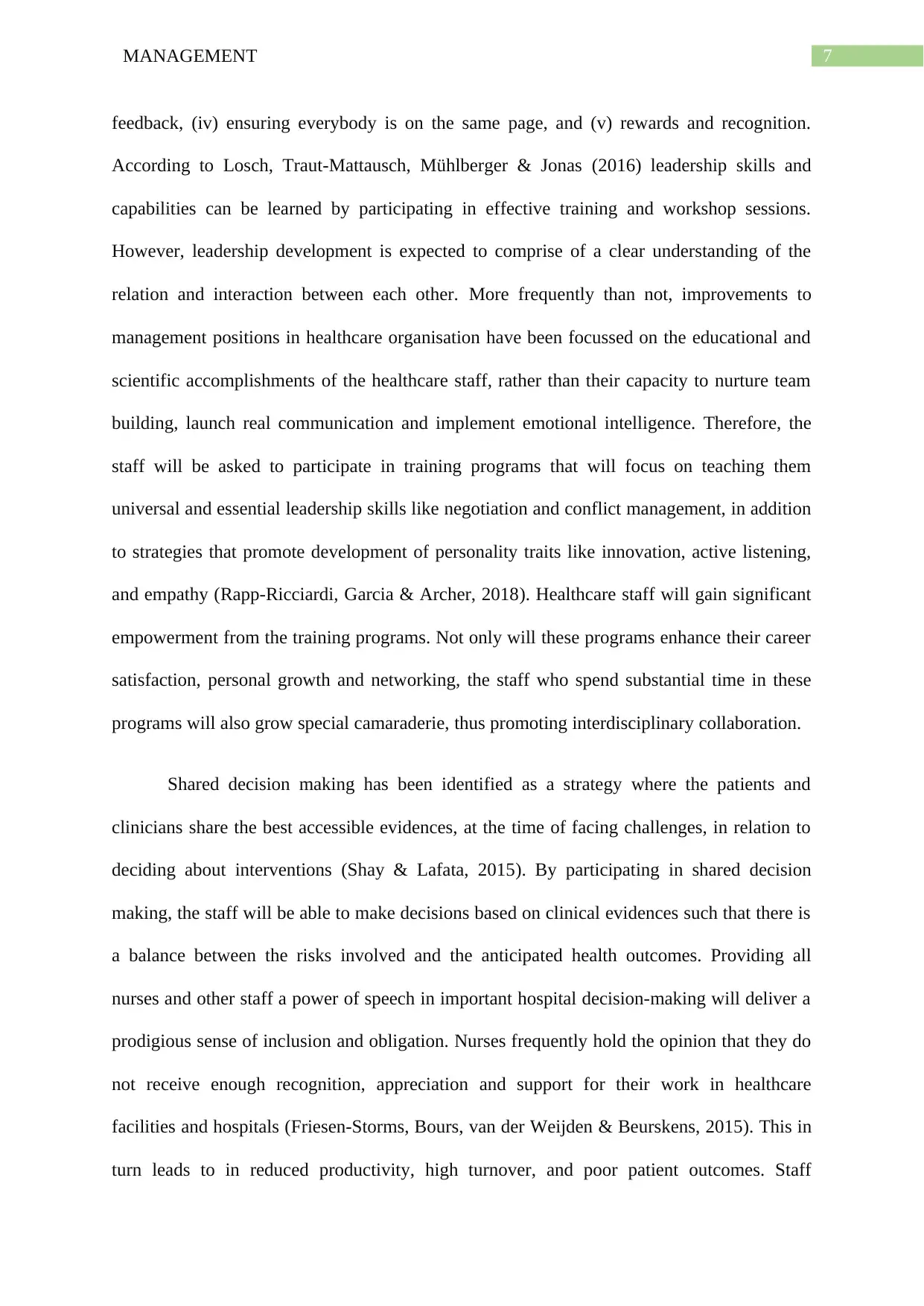
7MANAGEMENT
feedback, (iv) ensuring everybody is on the same page, and (v) rewards and recognition.
According to Losch, Traut-Mattausch, Mühlberger & Jonas (2016) leadership skills and
capabilities can be learned by participating in effective training and workshop sessions.
However, leadership development is expected to comprise of a clear understanding of the
relation and interaction between each other. More frequently than not, improvements to
management positions in healthcare organisation have been focussed on the educational and
scientific accomplishments of the healthcare staff, rather than their capacity to nurture team
building, launch real communication and implement emotional intelligence. Therefore, the
staff will be asked to participate in training programs that will focus on teaching them
universal and essential leadership skills like negotiation and conflict management, in addition
to strategies that promote development of personality traits like innovation, active listening,
and empathy (Rapp-Ricciardi, Garcia & Archer, 2018). Healthcare staff will gain significant
empowerment from the training programs. Not only will these programs enhance their career
satisfaction, personal growth and networking, the staff who spend substantial time in these
programs will also grow special camaraderie, thus promoting interdisciplinary collaboration.
Shared decision making has been identified as a strategy where the patients and
clinicians share the best accessible evidences, at the time of facing challenges, in relation to
deciding about interventions (Shay & Lafata, 2015). By participating in shared decision
making, the staff will be able to make decisions based on clinical evidences such that there is
a balance between the risks involved and the anticipated health outcomes. Providing all
nurses and other staff a power of speech in important hospital decision-making will deliver a
prodigious sense of inclusion and obligation. Nurses frequently hold the opinion that they do
not receive enough recognition, appreciation and support for their work in healthcare
facilities and hospitals (Friesen-Storms, Bours, van der Weijden & Beurskens, 2015). This in
turn leads to in reduced productivity, high turnover, and poor patient outcomes. Staff
feedback, (iv) ensuring everybody is on the same page, and (v) rewards and recognition.
According to Losch, Traut-Mattausch, Mühlberger & Jonas (2016) leadership skills and
capabilities can be learned by participating in effective training and workshop sessions.
However, leadership development is expected to comprise of a clear understanding of the
relation and interaction between each other. More frequently than not, improvements to
management positions in healthcare organisation have been focussed on the educational and
scientific accomplishments of the healthcare staff, rather than their capacity to nurture team
building, launch real communication and implement emotional intelligence. Therefore, the
staff will be asked to participate in training programs that will focus on teaching them
universal and essential leadership skills like negotiation and conflict management, in addition
to strategies that promote development of personality traits like innovation, active listening,
and empathy (Rapp-Ricciardi, Garcia & Archer, 2018). Healthcare staff will gain significant
empowerment from the training programs. Not only will these programs enhance their career
satisfaction, personal growth and networking, the staff who spend substantial time in these
programs will also grow special camaraderie, thus promoting interdisciplinary collaboration.
Shared decision making has been identified as a strategy where the patients and
clinicians share the best accessible evidences, at the time of facing challenges, in relation to
deciding about interventions (Shay & Lafata, 2015). By participating in shared decision
making, the staff will be able to make decisions based on clinical evidences such that there is
a balance between the risks involved and the anticipated health outcomes. Providing all
nurses and other staff a power of speech in important hospital decision-making will deliver a
prodigious sense of inclusion and obligation. Nurses frequently hold the opinion that they do
not receive enough recognition, appreciation and support for their work in healthcare
facilities and hospitals (Friesen-Storms, Bours, van der Weijden & Beurskens, 2015). This in
turn leads to in reduced productivity, high turnover, and poor patient outcomes. Staff
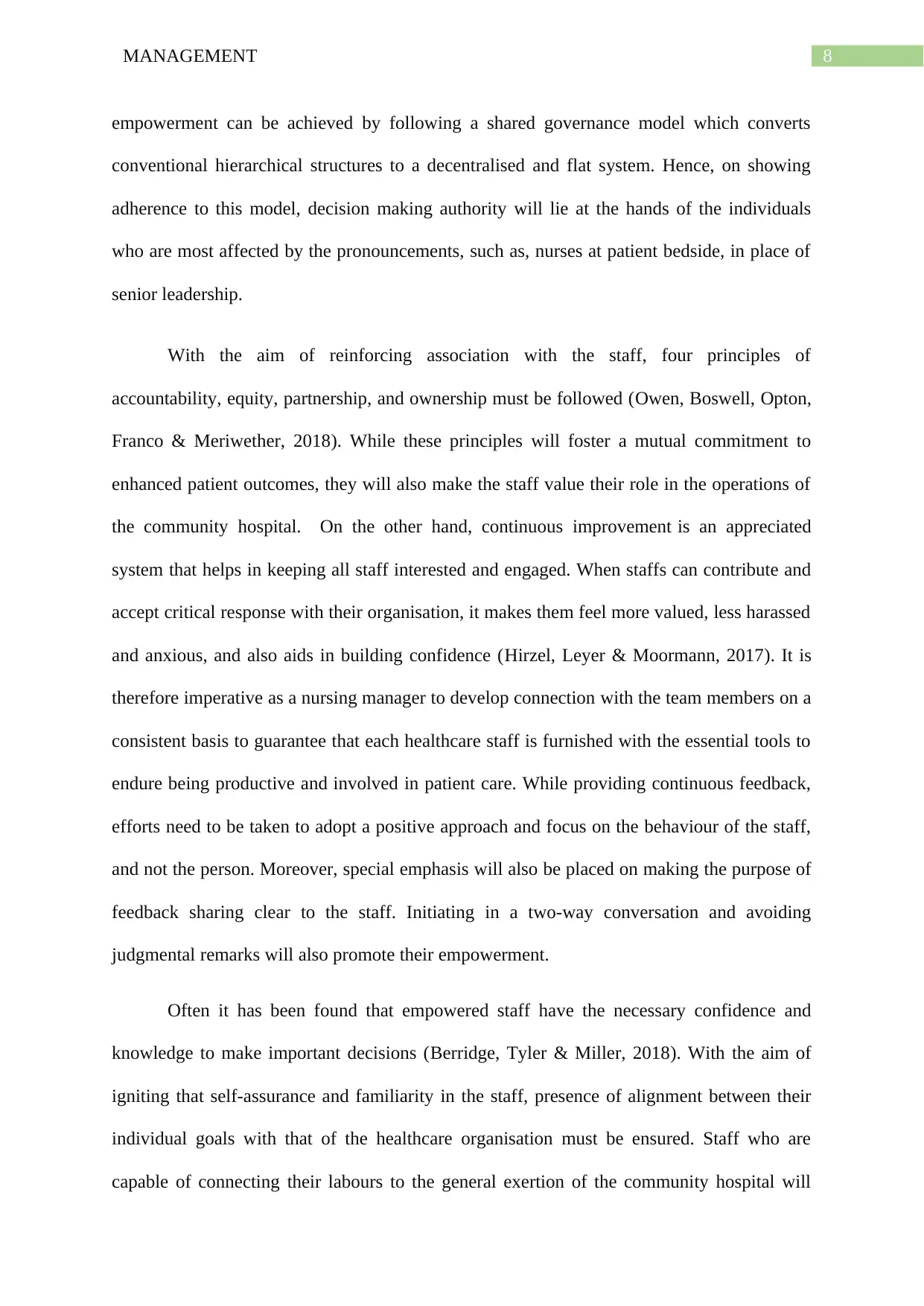
8MANAGEMENT
empowerment can be achieved by following a shared governance model which converts
conventional hierarchical structures to a decentralised and flat system. Hence, on showing
adherence to this model, decision making authority will lie at the hands of the individuals
who are most affected by the pronouncements, such as, nurses at patient bedside, in place of
senior leadership.
With the aim of reinforcing association with the staff, four principles of
accountability, equity, partnership, and ownership must be followed (Owen, Boswell, Opton,
Franco & Meriwether, 2018). While these principles will foster a mutual commitment to
enhanced patient outcomes, they will also make the staff value their role in the operations of
the community hospital. On the other hand, continuous improvement is an appreciated
system that helps in keeping all staff interested and engaged. When staffs can contribute and
accept critical response with their organisation, it makes them feel more valued, less harassed
and anxious, and also aids in building confidence (Hirzel, Leyer & Moormann, 2017). It is
therefore imperative as a nursing manager to develop connection with the team members on a
consistent basis to guarantee that each healthcare staff is furnished with the essential tools to
endure being productive and involved in patient care. While providing continuous feedback,
efforts need to be taken to adopt a positive approach and focus on the behaviour of the staff,
and not the person. Moreover, special emphasis will also be placed on making the purpose of
feedback sharing clear to the staff. Initiating in a two-way conversation and avoiding
judgmental remarks will also promote their empowerment.
Often it has been found that empowered staff have the necessary confidence and
knowledge to make important decisions (Berridge, Tyler & Miller, 2018). With the aim of
igniting that self-assurance and familiarity in the staff, presence of alignment between their
individual goals with that of the healthcare organisation must be ensured. Staff who are
capable of connecting their labours to the general exertion of the community hospital will
empowerment can be achieved by following a shared governance model which converts
conventional hierarchical structures to a decentralised and flat system. Hence, on showing
adherence to this model, decision making authority will lie at the hands of the individuals
who are most affected by the pronouncements, such as, nurses at patient bedside, in place of
senior leadership.
With the aim of reinforcing association with the staff, four principles of
accountability, equity, partnership, and ownership must be followed (Owen, Boswell, Opton,
Franco & Meriwether, 2018). While these principles will foster a mutual commitment to
enhanced patient outcomes, they will also make the staff value their role in the operations of
the community hospital. On the other hand, continuous improvement is an appreciated
system that helps in keeping all staff interested and engaged. When staffs can contribute and
accept critical response with their organisation, it makes them feel more valued, less harassed
and anxious, and also aids in building confidence (Hirzel, Leyer & Moormann, 2017). It is
therefore imperative as a nursing manager to develop connection with the team members on a
consistent basis to guarantee that each healthcare staff is furnished with the essential tools to
endure being productive and involved in patient care. While providing continuous feedback,
efforts need to be taken to adopt a positive approach and focus on the behaviour of the staff,
and not the person. Moreover, special emphasis will also be placed on making the purpose of
feedback sharing clear to the staff. Initiating in a two-way conversation and avoiding
judgmental remarks will also promote their empowerment.
Often it has been found that empowered staff have the necessary confidence and
knowledge to make important decisions (Berridge, Tyler & Miller, 2018). With the aim of
igniting that self-assurance and familiarity in the staff, presence of alignment between their
individual goals with that of the healthcare organisation must be ensured. Staff who are
capable of connecting their labours to the general exertion of the community hospital will
⊘ This is a preview!⊘
Do you want full access?
Subscribe today to unlock all pages.

Trusted by 1+ million students worldwide
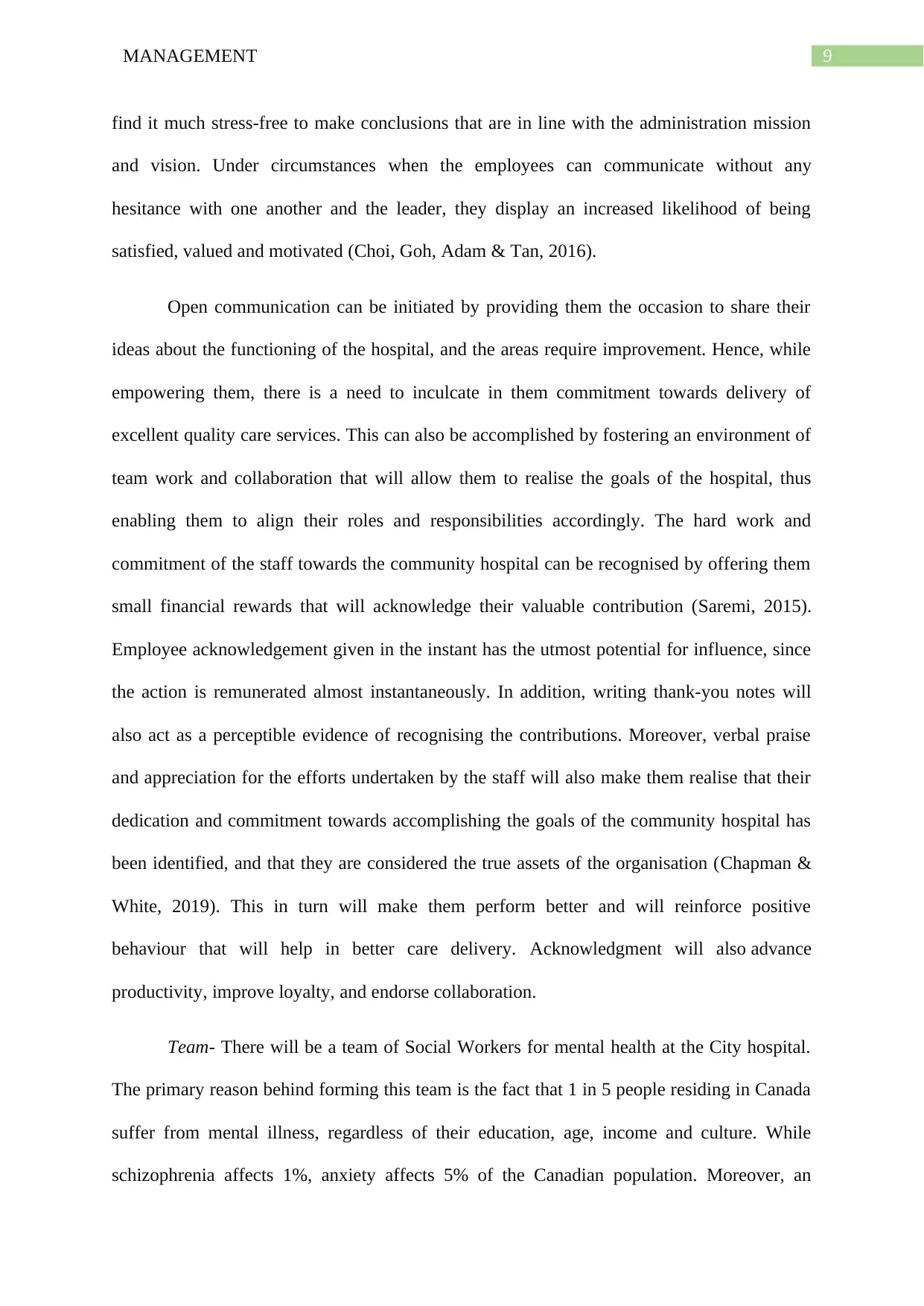
9MANAGEMENT
find it much stress-free to make conclusions that are in line with the administration mission
and vision. Under circumstances when the employees can communicate without any
hesitance with one another and the leader, they display an increased likelihood of being
satisfied, valued and motivated (Choi, Goh, Adam & Tan, 2016).
Open communication can be initiated by providing them the occasion to share their
ideas about the functioning of the hospital, and the areas require improvement. Hence, while
empowering them, there is a need to inculcate in them commitment towards delivery of
excellent quality care services. This can also be accomplished by fostering an environment of
team work and collaboration that will allow them to realise the goals of the hospital, thus
enabling them to align their roles and responsibilities accordingly. The hard work and
commitment of the staff towards the community hospital can be recognised by offering them
small financial rewards that will acknowledge their valuable contribution (Saremi, 2015).
Employee acknowledgement given in the instant has the utmost potential for influence, since
the action is remunerated almost instantaneously. In addition, writing thank-you notes will
also act as a perceptible evidence of recognising the contributions. Moreover, verbal praise
and appreciation for the efforts undertaken by the staff will also make them realise that their
dedication and commitment towards accomplishing the goals of the community hospital has
been identified, and that they are considered the true assets of the organisation (Chapman &
White, 2019). This in turn will make them perform better and will reinforce positive
behaviour that will help in better care delivery. Acknowledgment will also advance
productivity, improve loyalty, and endorse collaboration.
Team- There will be a team of Social Workers for mental health at the City hospital.
The primary reason behind forming this team is the fact that 1 in 5 people residing in Canada
suffer from mental illness, regardless of their education, age, income and culture. While
schizophrenia affects 1%, anxiety affects 5% of the Canadian population. Moreover, an
find it much stress-free to make conclusions that are in line with the administration mission
and vision. Under circumstances when the employees can communicate without any
hesitance with one another and the leader, they display an increased likelihood of being
satisfied, valued and motivated (Choi, Goh, Adam & Tan, 2016).
Open communication can be initiated by providing them the occasion to share their
ideas about the functioning of the hospital, and the areas require improvement. Hence, while
empowering them, there is a need to inculcate in them commitment towards delivery of
excellent quality care services. This can also be accomplished by fostering an environment of
team work and collaboration that will allow them to realise the goals of the hospital, thus
enabling them to align their roles and responsibilities accordingly. The hard work and
commitment of the staff towards the community hospital can be recognised by offering them
small financial rewards that will acknowledge their valuable contribution (Saremi, 2015).
Employee acknowledgement given in the instant has the utmost potential for influence, since
the action is remunerated almost instantaneously. In addition, writing thank-you notes will
also act as a perceptible evidence of recognising the contributions. Moreover, verbal praise
and appreciation for the efforts undertaken by the staff will also make them realise that their
dedication and commitment towards accomplishing the goals of the community hospital has
been identified, and that they are considered the true assets of the organisation (Chapman &
White, 2019). This in turn will make them perform better and will reinforce positive
behaviour that will help in better care delivery. Acknowledgment will also advance
productivity, improve loyalty, and endorse collaboration.
Team- There will be a team of Social Workers for mental health at the City hospital.
The primary reason behind forming this team is the fact that 1 in 5 people residing in Canada
suffer from mental illness, regardless of their education, age, income and culture. While
schizophrenia affects 1%, anxiety affects 5% of the Canadian population. Moreover, an
Paraphrase This Document
Need a fresh take? Get an instant paraphrase of this document with our AI Paraphraser
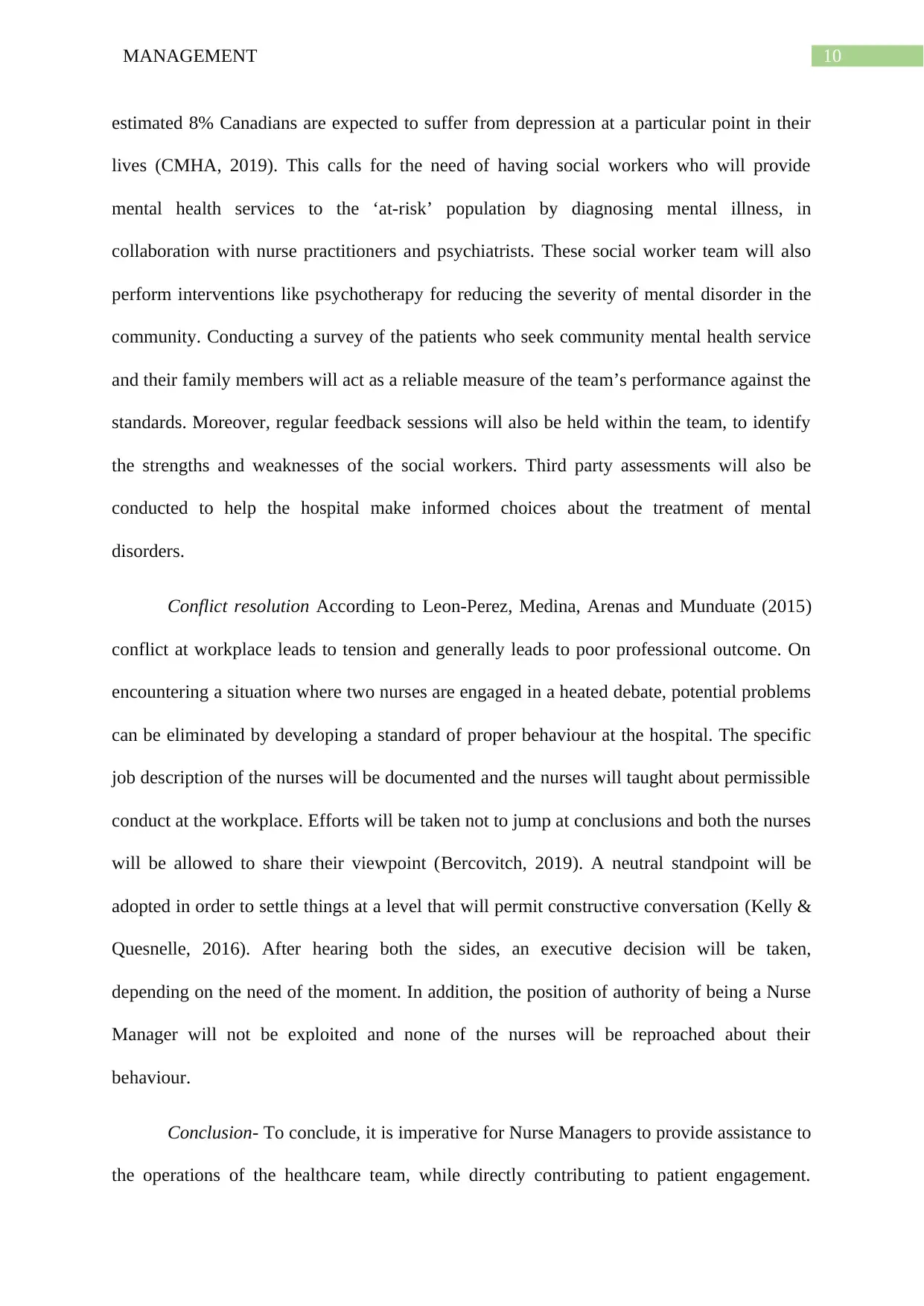
10MANAGEMENT
estimated 8% Canadians are expected to suffer from depression at a particular point in their
lives (CMHA, 2019). This calls for the need of having social workers who will provide
mental health services to the ‘at-risk’ population by diagnosing mental illness, in
collaboration with nurse practitioners and psychiatrists. These social worker team will also
perform interventions like psychotherapy for reducing the severity of mental disorder in the
community. Conducting a survey of the patients who seek community mental health service
and their family members will act as a reliable measure of the team’s performance against the
standards. Moreover, regular feedback sessions will also be held within the team, to identify
the strengths and weaknesses of the social workers. Third party assessments will also be
conducted to help the hospital make informed choices about the treatment of mental
disorders.
Conflict resolution According to Leon-Perez, Medina, Arenas and Munduate (2015)
conflict at workplace leads to tension and generally leads to poor professional outcome. On
encountering a situation where two nurses are engaged in a heated debate, potential problems
can be eliminated by developing a standard of proper behaviour at the hospital. The specific
job description of the nurses will be documented and the nurses will taught about permissible
conduct at the workplace. Efforts will be taken not to jump at conclusions and both the nurses
will be allowed to share their viewpoint (Bercovitch, 2019). A neutral standpoint will be
adopted in order to settle things at a level that will permit constructive conversation (Kelly &
Quesnelle, 2016). After hearing both the sides, an executive decision will be taken,
depending on the need of the moment. In addition, the position of authority of being a Nurse
Manager will not be exploited and none of the nurses will be reproached about their
behaviour.
Conclusion- To conclude, it is imperative for Nurse Managers to provide assistance to
the operations of the healthcare team, while directly contributing to patient engagement.
estimated 8% Canadians are expected to suffer from depression at a particular point in their
lives (CMHA, 2019). This calls for the need of having social workers who will provide
mental health services to the ‘at-risk’ population by diagnosing mental illness, in
collaboration with nurse practitioners and psychiatrists. These social worker team will also
perform interventions like psychotherapy for reducing the severity of mental disorder in the
community. Conducting a survey of the patients who seek community mental health service
and their family members will act as a reliable measure of the team’s performance against the
standards. Moreover, regular feedback sessions will also be held within the team, to identify
the strengths and weaknesses of the social workers. Third party assessments will also be
conducted to help the hospital make informed choices about the treatment of mental
disorders.
Conflict resolution According to Leon-Perez, Medina, Arenas and Munduate (2015)
conflict at workplace leads to tension and generally leads to poor professional outcome. On
encountering a situation where two nurses are engaged in a heated debate, potential problems
can be eliminated by developing a standard of proper behaviour at the hospital. The specific
job description of the nurses will be documented and the nurses will taught about permissible
conduct at the workplace. Efforts will be taken not to jump at conclusions and both the nurses
will be allowed to share their viewpoint (Bercovitch, 2019). A neutral standpoint will be
adopted in order to settle things at a level that will permit constructive conversation (Kelly &
Quesnelle, 2016). After hearing both the sides, an executive decision will be taken,
depending on the need of the moment. In addition, the position of authority of being a Nurse
Manager will not be exploited and none of the nurses will be reproached about their
behaviour.
Conclusion- To conclude, it is imperative for Nurse Managers to provide assistance to
the operations of the healthcare team, while directly contributing to patient engagement.
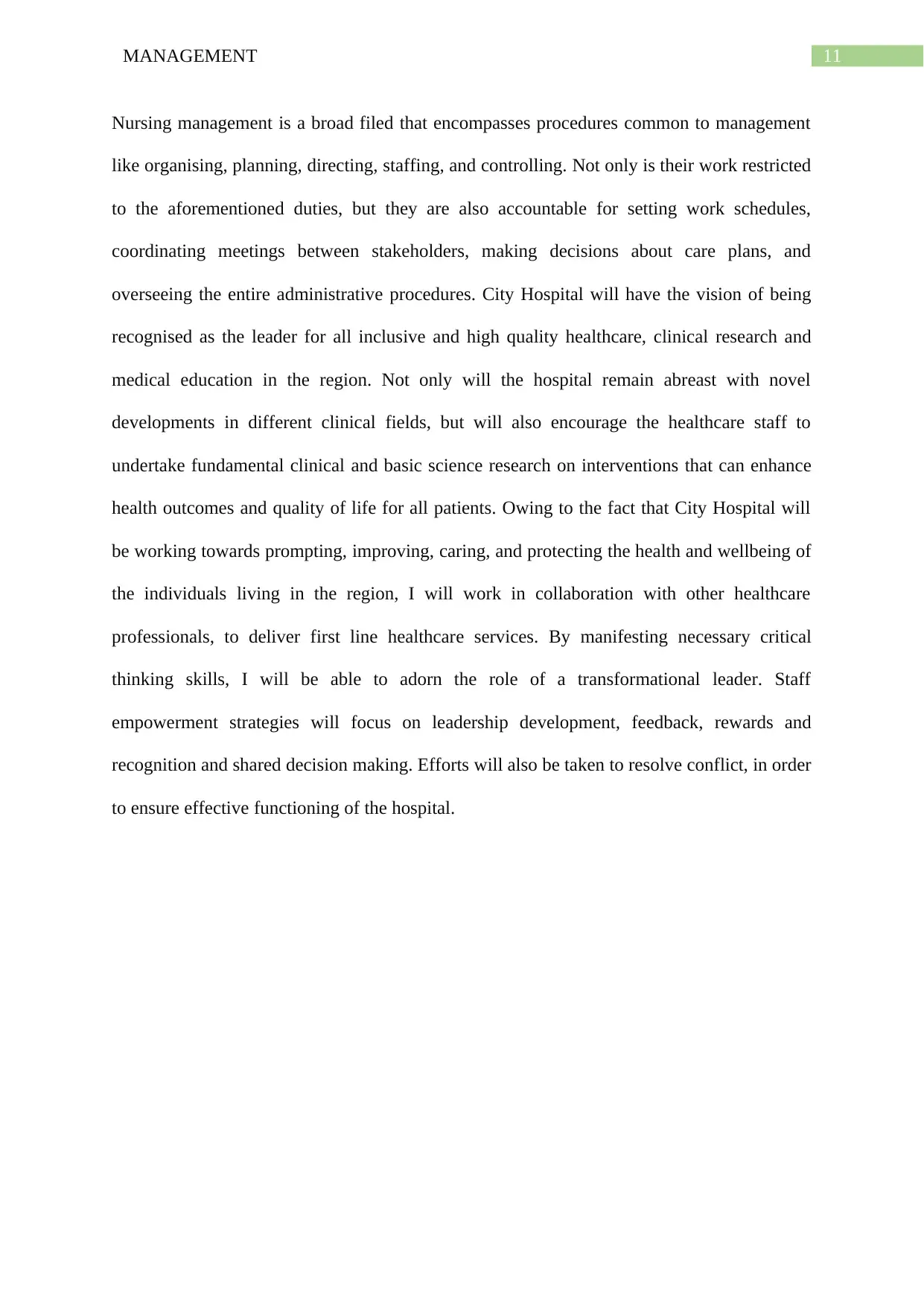
11MANAGEMENT
Nursing management is a broad filed that encompasses procedures common to management
like organising, planning, directing, staffing, and controlling. Not only is their work restricted
to the aforementioned duties, but they are also accountable for setting work schedules,
coordinating meetings between stakeholders, making decisions about care plans, and
overseeing the entire administrative procedures. City Hospital will have the vision of being
recognised as the leader for all inclusive and high quality healthcare, clinical research and
medical education in the region. Not only will the hospital remain abreast with novel
developments in different clinical fields, but will also encourage the healthcare staff to
undertake fundamental clinical and basic science research on interventions that can enhance
health outcomes and quality of life for all patients. Owing to the fact that City Hospital will
be working towards prompting, improving, caring, and protecting the health and wellbeing of
the individuals living in the region, I will work in collaboration with other healthcare
professionals, to deliver first line healthcare services. By manifesting necessary critical
thinking skills, I will be able to adorn the role of a transformational leader. Staff
empowerment strategies will focus on leadership development, feedback, rewards and
recognition and shared decision making. Efforts will also be taken to resolve conflict, in order
to ensure effective functioning of the hospital.
Nursing management is a broad filed that encompasses procedures common to management
like organising, planning, directing, staffing, and controlling. Not only is their work restricted
to the aforementioned duties, but they are also accountable for setting work schedules,
coordinating meetings between stakeholders, making decisions about care plans, and
overseeing the entire administrative procedures. City Hospital will have the vision of being
recognised as the leader for all inclusive and high quality healthcare, clinical research and
medical education in the region. Not only will the hospital remain abreast with novel
developments in different clinical fields, but will also encourage the healthcare staff to
undertake fundamental clinical and basic science research on interventions that can enhance
health outcomes and quality of life for all patients. Owing to the fact that City Hospital will
be working towards prompting, improving, caring, and protecting the health and wellbeing of
the individuals living in the region, I will work in collaboration with other healthcare
professionals, to deliver first line healthcare services. By manifesting necessary critical
thinking skills, I will be able to adorn the role of a transformational leader. Staff
empowerment strategies will focus on leadership development, feedback, rewards and
recognition and shared decision making. Efforts will also be taken to resolve conflict, in order
to ensure effective functioning of the hospital.
⊘ This is a preview!⊘
Do you want full access?
Subscribe today to unlock all pages.

Trusted by 1+ million students worldwide
1 out of 17
Related Documents
Your All-in-One AI-Powered Toolkit for Academic Success.
+13062052269
info@desklib.com
Available 24*7 on WhatsApp / Email
![[object Object]](/_next/static/media/star-bottom.7253800d.svg)
Unlock your academic potential
Copyright © 2020–2026 A2Z Services. All Rights Reserved. Developed and managed by ZUCOL.





